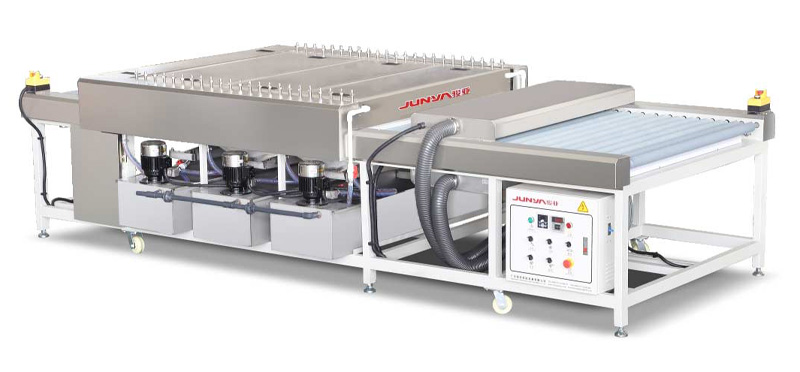Werfen wir einen Blick auf die Prinzipien und Vorteile von Isolierglaswaschmaschinen!
The working principle of the insulating glass washer is reflected in the transmission system, brushing process, and water rinsing. The advantages of the insulating glass washer include high efficiency cleaning capacity, fine brushing configuration, and water rinsing system.
Principle of operation:
1.Transmission system:
Insulating glass washing machines are usually equipped with an automated drive system that automatically transports the glass into the washing area.
The purpose of the transmission system is to ensure that the glass remains stable during the cleaning process, avoiding damage or contamination caused by manual handling.
This automated handling increases overall efficiency and reduces the consumption of human resources.
The speed of the drive belt is adjustable to suit the cleaning needs of different glass sizes and thicknesses.
In addition, modern transmission systems are mostly made of corrosion-resistant materials to prolong the service life of the equipment.
2. Brushing process:
Brushing is the core part of the washing machine, which usually adopts soft bristles or nylon brushes to deeply clean the glass surface.
The brushes are designed with different types and sizes of glass in mind to thoroughly remove surface dirt and impurities.
During the brushing process, the pressure of the brush in contact with the glass surface can be adjusted to accommodate glass materials with different sensitivities.
Some high-end machines are also equipped with a brush wear detection system to ensure consistent cleaning quality.
The brushing section may be equipped with water jets that work in tandem with the brushes to enhance cleaning results.
3. Rinse with water:
After brushing, the glass needs to be rinsed with fresh water to remove all loose dirt and cleaning agents.
Fresh water rinsing usually uses a high-pressure nozzle to ensure a strong enough stream of water to clean the glass surface.
The water is kept clean by a filtration and circulation system to avoid secondary contamination.
Higher grade units may be equipped with a heating function that uses warm water to increase the efficiency of the rinse.
The rinsed water can be recycled and reused through a water treatment unit to comply with environmental requirements.
4. Pure water rinsing:
To achieve a higher standard of cleanliness, some washers use pure water as the final rinse medium.
Pure water rinsing removes all residual water traces and minerals, leaving the glass dry and streak-free.
Pure water systems often include reverse osmosis or other water purification technologies to ensure pure water quality.
Equipment that uses pure water is usually suitable for the cleaning of high quality glass or special purpose glass.
Pure water rinsing is one of the hallmarks of high-end washers, representing the level of sophistication and technical grade of the equipment.
Advantageous features:
1. Highly efficient cleaning capacity:
Insulating glass washers are designed to efficiently remove dirt and contaminants, reducing waiting time and increasing productivity.
Efficient cleaning not only increases production, but also ensures the quality of subsequent processes, such as coating or bonding.
High efficiency is achieved thanks to advanced technology and optimised process design, including a quick glass change mechanism and a fast drying system.
2. Fine brushing configuration:
The brushing system adjusts pressure and speed to different glass thicknesses and fragility levels, ensuring that all glass materials are properly cleaned.
The fine configuration also includes a wide selection of brush sizes to accommodate a wide range of products from small parts to large panels.
Brush material options are also diverse, ranging from soft bristle brushes to rigid nylon brushes, providing solutions for different cleaning needs.
3. Fresh water rinsing system:
The fresh water rinsing system is designed to remove all impurities and cleaning agents released during the brushing process, ensuring clean glass.
High-pressure spray nozzles ensure even coverage, leaving no dead spots.
Highly efficient filtration and water treatment systems ensure that the water used is always of a high standard, preventing water quality problems from affecting the quality of the final product.
4. Drying technology:
Cleaned glass needs to be dried effectively to prevent water damage, the insulating glass washer uses advanced air knife and hot air technology to dry the glass quickly.
Hot air drying not only speeds up the production process, but also prevents water spots from leaving traces on the glass that can affect transparency and aesthetics.
Some machines are also equipped with a cold air option for heat-sensitive glass or special requirements.
5. Intelligent control system:
Modern insulating glass washing machines are usually equipped with an intelligent control system for simplified operation and precise control of parameters.
The control system enables automatic adjustment of various stages of operation, such as brush speed, water temperature and drying temperature, to suit different batches of glass.
The advanced equipment can also be remotely monitored and troubleshooted via a network connection, improving maintenance efficiency and machine uptime.
In summary, insulating glass washing machines have become indispensable equipment for modern glass processing with their advanced working principles and multifaceted advantages. Through continuous technological innovation and functional optimisation, it not only improves the quality of glass processing, but also greatly improves the production efficiency, bringing significant economic benefits for enterprises. In the future development, insulating glass washing machine will continue to play an important role in helping the progress and innovation of the glass industry.
